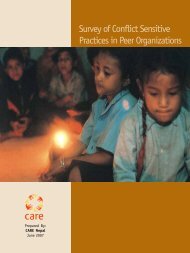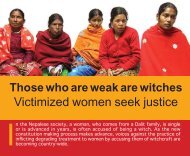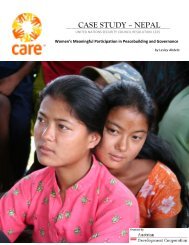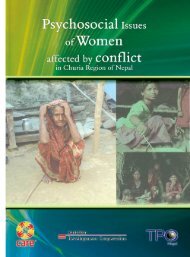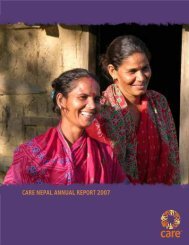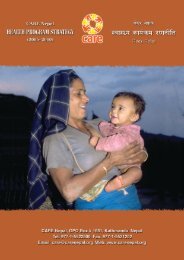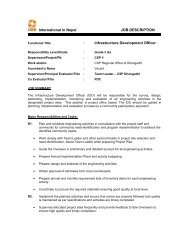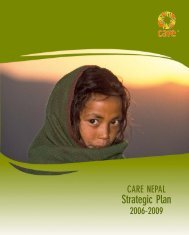Create successful ePaper yourself
Turn your PDF publications into a flip-book with our unique Google optimized e-Paper software.
Message from the Country Director<br />
the diversity and richness of <strong>Nepal</strong> was reflected in the 601 seat<br />
In <strong>2008</strong>, Constituent Assembly (CA) elections through the election or<br />
nomination of 197 women and 50 Dalits. This led to the initiation of programs which<br />
provided opportunities for communities to challenge the structure, system and policies<br />
of the past. These programs have been utilizing new and innovative approaches based on<br />
an in-depth analysis of the root causes of poverty and social injustice. They have been<br />
mobilizing the poorest women and men in communities to demand access and control over<br />
resources to ensure a better quality of life. <strong>CARE</strong> <strong>Nepal</strong> has facilitated the engagement<br />
between women’s groups from 25 districts and CA members to assist them in collecting<br />
feedback from stakeholders on key issues which needed to be addressed in the constitution<br />
making process.<br />
<strong>CARE</strong> <strong>Nepal</strong> has identified three primary focus areas for its current programs:<br />
1. Empowering women by focusing on the economic, social, political and cultural aspects<br />
of their lives. It has been tracking achievements resulting from changes in access and<br />
control over resources and how this brings about behavioural changes in patriarchal<br />
norms and age old stereotypes.<br />
2. Securing access to natural resources and livelihoods for the poor and vulnerable<br />
including Dalits, landless people, women and those most frequently affected by natural<br />
disasters<br />
3. Addressing issues of justice and equity through engagement with civil society and state<br />
actors on issues of identity in cultural and ethnic terms<br />
<strong>CARE</strong> <strong>Nepal</strong> has been working in collaboration with around 80 partner NGOs and hundreds<br />
of community groups on 24 projects and initiatives in 42 districts in <strong>Nepal</strong>. Many of these<br />
programs have now focused on key aspects of governance, rights and equity. <strong>CARE</strong> <strong>Nepal</strong><br />
has identified and worked with the poorest people in the most marginalized communities<br />
while amplifying their voices and concerns around issues which affect their lives and<br />
opportunities for improvement and growth.<br />
During the year, <strong>CARE</strong> <strong>Nepal</strong> has been restructuring field operations to form three<br />
cluster offices in Janakpur, Bharatpur and Doti to serve their surrounding areas. This has<br />
granted greater authority, accountability and inclusion to all stakeholders in key decision<br />
making processes. The new structure highlights the strategic role and responsibilities<br />
of collaborating partners. The strategic function of the country office has also been<br />
restructured to separate program development and implementation from monitoring and<br />
impact measurement. The country office has been involved in networks like the Association<br />
of International NGOs (AIN) to create a more credible development space in <strong>Nepal</strong>. It<br />
has also been involved in various networks to prevent sexual and gender based violence<br />
(SGBV), violence against women, tracking rights violations through the Office of the High<br />
Commissioner for Human Rights (OHCHR), and implementing United Nations Security<br />
Council Resolution (UNSCR) 1325.<br />
<strong>CARE</strong> <strong>Nepal</strong> is committed to gender equity and diversity. This is best reflected in its own<br />
staff. Of the total staff hired in <strong>2008</strong>, 58% are men and 41% are women. The percentage<br />
of staff from the Terai and Dalits among the new recruits was 37% and 14% respectively.<br />
Further, after several years, there are now 13 women in managerial positions and above in<br />
<strong>CARE</strong> <strong>Nepal</strong>.<br />
The emerging social and political scenario in <strong>Nepal</strong> will pose further challenges for<br />
agencies like <strong>CARE</strong> <strong>Nepal</strong>. New developments in the state may lead to a different policy<br />
framework within which international and national development agencies will have to<br />
function. This change in structure will be further influenced by <strong>Nepal</strong> moving towards a<br />
federal system. However, there are significant opportunities for <strong>Nepal</strong> to benefit from<br />
decentralized and focused development initiatives.<br />
Alka Pathak<br />
<strong>CARE</strong> <strong>Nepal</strong> continues to work according to <strong>CARE</strong>’s global focus and priorities by assisting the poorest women<br />
and girls, who live in situations of poverty and deprivation – to create a world where all people have the<br />
opportunity to realize their full potential and find their own voice. Because in the end that is the key to ending<br />
injustice and poverty.<br />
The <strong>CARE</strong> International Confederation of twelve member organizations has its Secretariat in Geneva. <strong>CARE</strong><br />
<strong>Nepal</strong> operations are coordinated by its “Lead Member” <strong>CARE</strong> USA.<br />
The <strong>Annual</strong> <strong>Report</strong> ’08 1



